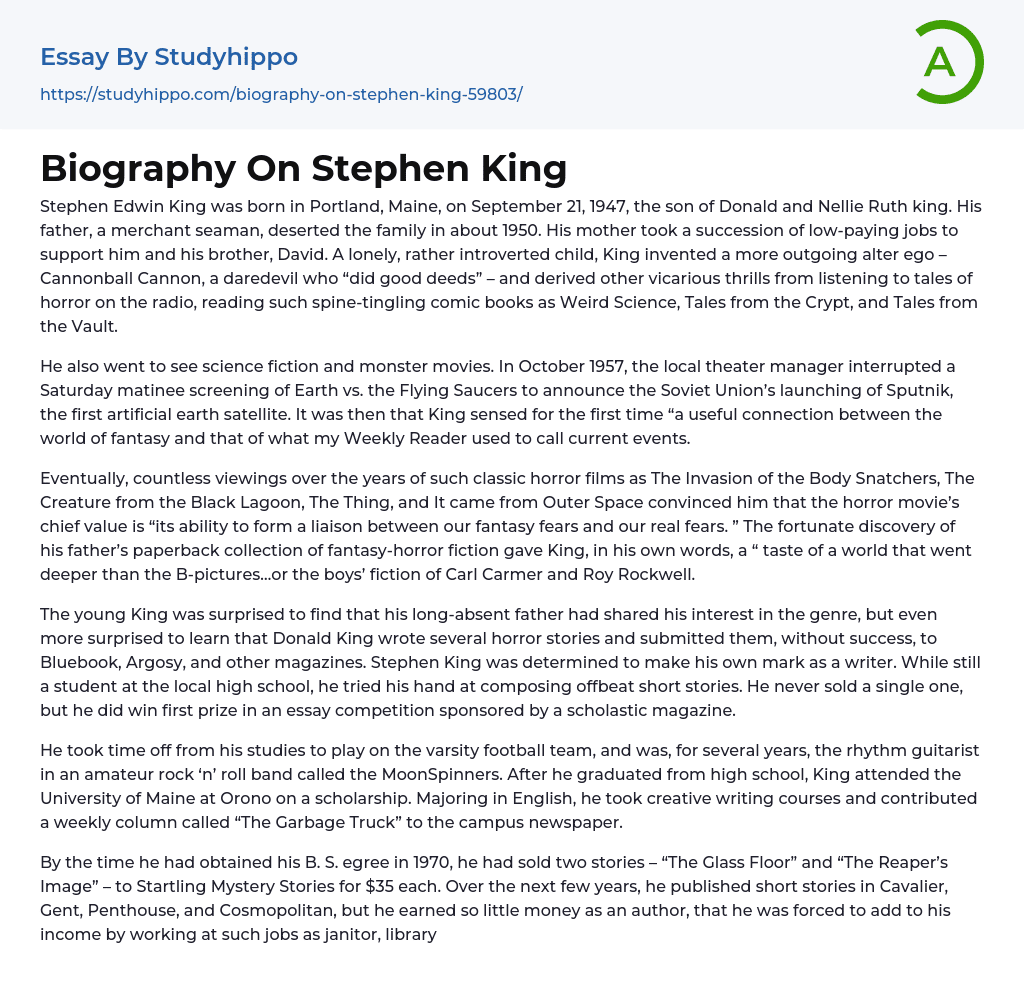Stephen Edwin King was born on September 21, 1947, in Portland, Maine. He is the son of Donald and Nellie Ruth King. Unfortunately, around 1950, his father, a merchant seaman, abandoned the family.
To support Stephen and his brother David, their mother had to work multiple low-paying jobs.
Stephen was a somewhat introverted child and experienced feelings of loneliness. To counteract this, he created an extroverted alter ego called Cannonball Cannon who performed daring acts of kindness.
Moreover,
he found excitement through listening to horror stories on the radio and reading eerie comic books like Weird Science, Tales from the Crypt,
and Tales from the Vault.
While watching Earth vs. the Flying Saucers in October 1957, King had a chance to enjoy science fiction and monster movies during a Saturday matinee showing. However, the theater manager interrupted the screening to
...share news about the Soviet Union's launch of Sputnik - Earth's first man-made satellite in orbit. This incident proved significant for King as it revealed how his passion for fantasy intertwined with real-world events, as mentioned in publications like his Weekly Reader.
Throughout the years, the author has observed numerous classic horror films such as The Invasion of the Body Snatchers, The Creature from the Black Lagoon, The Thing, and It came from Outer Space. These screenings have persuaded him that horror movies connect our imagined fears to our real fears. Furthermore, he had the fortunate experience of discovering his father's compilation of fantasy-horror fiction novels. This collection introduced him to a realm that surpassed B-movies or boys' fiction by Carl Carmer and Roy Rockwell.
The young King was surprised to discover that his father, who had been absent for a considerable period,
shared his enthusiasm for the same genre. What struck him even more was the revelation that Donald King had authored numerous horror tales and made unsuccessful attempts at having them published in magazines such as Bluebook and Argosy. Stephen King was resolute in his ambition to establish himself as a writer. Even during high school, he endeavored to create original short stories. Although he didn't achieve any sales, he did secure first place in an essay contest sponsored by a scholastic magazine.
While studying, he joined the varsity football team and played rhythm guitar in a rock 'n' roll band called the MoonSpinners. After high school, King received a scholarship to attend the University of Maine at Orono. He studied English and took creative writing classes, as well as wrote a weekly column titled "The Garbage Truck" for the university's newspaper.
In 1970, after obtaining his B.S. degree, he had successfully sold two stories - "The Glass Floor" and "The Reaper's Image" - to Startling Mystery Stories for $35 each. Despite publishing short stories in Cavalier, Gent, Penthouse, and Cosmopolitan over the following years, he earned very little income as a writer, which forced him to work various jobs such as a janitor, library aide, gas station attendant, and presser in an industrial laundry. King experienced discouragement and sadness due to the increasing number of rejection slips he received, to the point where he almost abandoned the manuscript which would eventually become his first published novel, Carrie.
Luckily, Stephen King's wife found the discarded pages in the garbage and encouraged him to complete the book. She convinced him to send it to Bill Thompson, an editor at Doubleday
& Company, Inc., who had previously expressed interest in his writing. While a few critics deemed Carrie excessively gory, horror enthusiasts swiftly embraced it. Ultimately, the book sold more than 4 million copies and its film adaptation emerged as one of the top-grossing movies in 1976. King gratefully acknowledges that "the movie made the book popular and the book brought attention to me."
Over the next several years, Doubleday published four more horror books by Stephen King: ‘Salem’s Lot (1975), The Shining (1977), Night Shift (1978), and The Stand (1978). In 1980, he published Firestarter, in 1981, Cujo, in 1987, Misery, and has produced many more novels and short stories since then. King says, in his introduction to Night Shift, “Beneath its fangs and fright wig,” the horror tale is ”as conservative as an Illinois Republican in a three-piece pinstriped suit.
With the intention of emphasizing the importance of social norms, the text illustrates the consequences faced by individuals who explore forbidden territories. Most horror stories incorporate a moral code that is notably strict, resembling that of Puritans. King, a highly productive writer, skillfully transforms ordinary circumstances, such as peer pressure, marital tension, or infidelity, into scenes of horror. Numerous of his novels have been adapted into successful films. Additionally, King has authored works using the name Richard Bachman.
- Book Summary essays
- Metaphor essays
- Reader essays
- Rhyme essays
- Literary devices essays
- Villain essays
- Books essays
- Genre essays
- Literary Criticism essays
- Writer essays
- Protagonist essays
- Simile essays
- Poem essays
- Book Report essays
- Book Review essays
- Greek Mythology essays
- Plot essays
- Tragic Hero essays
- Coming of Age essays
- Play essays
- Rhetoric essays
- Rhetorical Question essays
- Translation essays
- Understanding essays
- Reason essays
- Character essays
- Letter essays
- American Literature essays
- Literature Review essays
- Utopia essays
- Poetry Analysis essays
- Dante's Inferno essays
- Between The World and Me essays
- Incidents in The Life of a Slave Girl essays
- Flowers for Algernon essays
- Myth essays
- Everyday Use essays
- Boo Radley essays
- Genesis essays
- Richard iii essays
- Alice in Wonderland essays
- On the road essays
- Ozymandias essays
- The Nightingale essays
- Holden Caulfield essays
- Animal Farm essays
- 1984 essays
- A Hanging essays
- Shooting An Elephant essays
- A Tale Of Two Cities essays




